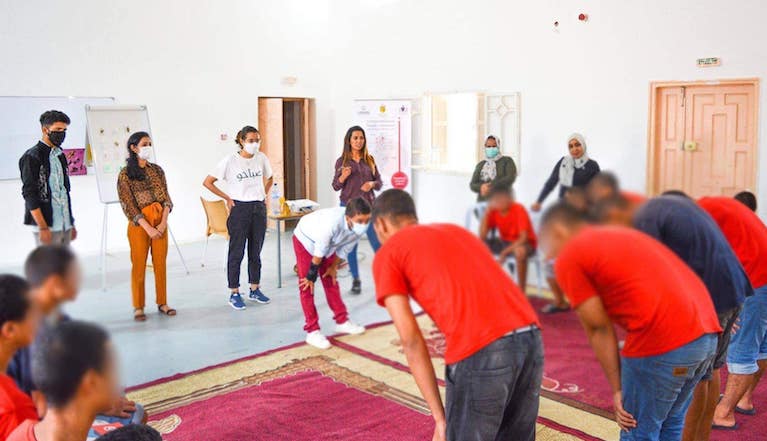Promoting critical-thinking skills among youth in Tunisia

The Ma3an: For Resilient Communities program creates sustainable resources for development in areas of Tunisia that are vulnerable to instability and violent extremism. The program does this by increasing their capacity to withstand political, social, and economic stresses. To increase inclusion in these communities, Ma3an engages a youth mentor network to support youth and strengthen their skills.
Ma3an operates in 33 Tunisian vulnerable communities, where the average age is under 35 years old. These youth have limited resources and opportunities, a major factor contributing to youth vulnerability and low civic engagement.
Ma3an provides technical support, capacity building, and resources to Ma3an youth mentors who contribute to community resilience by increasing youth’s critical thinking, leadership, peer support, and engagement in target communities.
The project decided to work with youth in juvenile rehabilitation centers to offer peer-to-peer support and provide an opportunity for marginalized youth to connect with their community.
In 2020,three youth mentors—Hamza, Houssem, and Khouloud—initiated a youth-led training and mentoring program for 110 youth at the Souk Jedid Juvenile Rehabilitation Center.
Strengthening skills and building confidence
The youth mentors conducted a series of training sessions at the facility. They started by teaching IREX’s media literacy curriculum, Learn to Discern. The training helped 65 participants develop skills to critically reflect on and question their media-related habits. An additional 45 youth attended storytelling and professional planning training that strengthened their skills to set their goals strategically and communicate effectively in professional environments.
At the end of the training, one of the participants confidently delivered a speech advising fellow residents to plan positive actions they can complete upon their return to their communities.
The youth felt especially motivated by the peer approach of the trainings and looked to the youth mentors as role models. One participant expressed his willingness to join the Ma3an youth network after completing his training.“I’m leaving the center in few months and I thought I only needed to learn gardening to make a living out there. It seems like it is not the case. I want to join Ma3an and learn more,” he said.
Increasing youth-led activities and inclusion
The training experience at Souk Jedid inspired the youth mentors to engage youth from diverse age groups, socioeconomic statuses, and educational backgrounds. This inspired Khouloud to ask, “Who are the other youth who cannot come to us? Who else feels excluded that we should reach out to?”
As a result, the youth mentors started to think of creating a youth-driven nonprofit organization to increase their impact. They founded Association Tunisienne Enfance et Jeunesse (Tunisian Organization for Children and Youth). Their organization will partner with the Juvenile Rehabilitation Center to conduct future training sessions at centers inside and outside the Souk Jedid community. They aim to increase youth’s engagement in community service and support youth as positive agents of change.
According to Houssem, the organization will continue to strengthen and sustain youth civic engagement by “organizing activities that highlight the effective role of youth” through partnerships with youth organizations and local authorities. Following the outbreak of COVID-19, the organization engaged youth in campaigns to sanitize public spaces, raise awareness of infection, and share precautionary measures. They have also organized training sessions on gender equality and contributed to classroom renovations at a local school.
These are just a few examples of how Ma3an is enhancing development in Tunisia. By engaging marginalized youth, identifying and reducing community-specific vulnerabilities, and creating collaborative networks, the program helps to promote communities’ social cohesion and resilience.